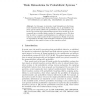1992 search results - page 26 / 399 » Model Based Testing with Labelled Transition Systems |
137
click to vote
EMSOFT
2005
Springer
15 years 8 months ago
2005
Springer
Hybrid systems are an appropriate formalism to model embedded systems as they capture the theme of continuous dynamics with discrete control. A simple extension, a network of comm...
133
Voted
MEMOCODE
2003
IEEE
15 years 7 months ago
2003
IEEE
In the design process of SoC (System on Chip), validation is one of the most critical and costly activity. The main problem for industrial companies like STMicroelectronics, stand...
ICRA
2007
IEEE
15 years 8 months ago
2007
IEEE
— We have developed a new communication robot, Robopal, which is an indoor/outdoor robot for use in humanrobot interaction research in the context of daily life. Robopal’s inte...
111
Voted
CONCUR
2000
Springer
15 years 6 months ago
2000
Springer
Abstract. In this paper, we introduce weak bisimulation in the framework of Labeled Concurrent Markov Chains, that is, probabilistic transition systems which exhibit both probabili...
124
click to vote
SAC
2006
ACM
15 years 2 months ago
2006
ACM
The objective of testing is to determine the conformance between a system and its specification. When testing distributed systems, the existence of multiple testers brings out the...

